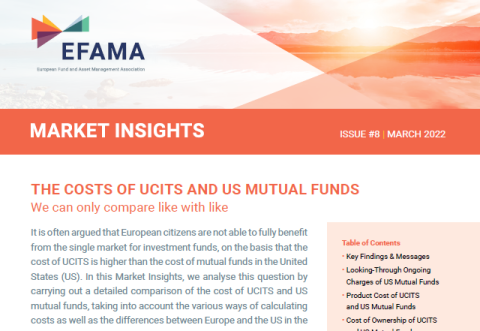EU Fund regulation
The EU fund product landscape is deep, diverse and dynamic. Since the birth of the UCITS framework in 1985, European institutions have progressively refined it into a global “gold standard”, one that successfully balances strict regulatory requirements with the flexibility required by manager to meet evolving client demands. The successful evolution of UCITS was followed by the creation of alternative investment funds (AIFs) under the 2011 AIFM Directive, adding a second important pillar to EU fund/manager regulation. Building on this second pillar are further ambitious EU fund products, such as EUSEFs, EUVECAs and ELTIFs. EFAMA has helped guide all of these key regulatory developments, informing policymakers and regulators on their main merits and drawbacks, while also keeping a close eye on their respective review initiatives.
EFAMA strongly supports a fundamental review to the ELTIF regime, in view of broadening its eligible investment universe and adapting it to better meet retail investor needs. We are also closely monitoring the review of the AIFM Directive from a product regulation standpoint, including possible spillover effects on the UCITS Directive requirements. Further work involves keeping pace with relevant ESMA initiatives, such as the work around the Common Supervisory Action on costs and fees for UCITS.
EFAMA's response to ESMA's CP on Implementing technical Standards under Regulation (EU) 2019/1156
Counterparty and liquidity risks in ETFs - EFAMA response to ECB
Our comment paper confutes the ECB study’s main findings by focusing on its two core areas, namely
liquidity and counterparty risks inherent to the structure and functioning of ETFs. A final section
considers the merits of further regulatory action addressed at the European ETF industry.
EFAMA’s comments on ESMA’s CP on Draft regulatory technical standards under Article 25 of ELTIF Regulation
European Money Market Funds navigated the Covid 19 crisis successfully
The European Fund and Asset Management Association (EFAMA) has published its second Market Insights highlighting the major trends shaping the European Money Market Fund (MMF) landscape since the entry into force of the Money Market Fund Regulation (MMFR).
Monthly Statistics July 2020 | Investors remained confident in investment outlook in July
The European Fund and Asset Management Association (EFAMA) has today published its latest monthly Investment Fund Industry Fact Sheet, which provides net sales data of UCITS and AIFs for July 2020*.
An ambitious CMU Action Plan that will need strong political support from Member States
Building a Capital Markets Union (CMU) that serves the needs of European citizens and businesses is an ambitious yet, essential - project that requires a long-term political vision, determination and perseverance.
The new CMU Action Plan adopted today by the European Commission, which largely builds on the recommendation of the CMU High-Level Forum, is a milestone in the journey towards the realisation of this ambition for Europe.
The costs of UCITS and US mutual funds | Market Insights | Issue #8
It is often argued that European citizens are not able to fully benefit from the single market for investment funds, on the basis that the cost of UCITS is higher than the cost of mutual funds in the United States (US). In this Market Insights, we analyse this question by carrying out a detailed comparison of the cost of UCITS and US mutual funds, taking into account the various ways of calculating costs as well as the differences between Europe and the US in the way investment funds are distributed.
Asset Management Report 2021
This is our 13th edition of the Asset Management in Europe report, which provides an in-depth analysis of recent trends in the European asset management industry, focussing on where investment funds and discretionary mandates are managed in Europe.
Fund managers retain only 41% of the total cost paid by retail investors | Market Insights | Issue #6
EFAMA has released its latest Market Insights report titled “Perspective on the costs of UCITS”. The full report breaks down the costs of UCITS, focusing on the fees charged for the different services provided along the investment fund value chain and distinguishing between the product cost for which fund managers are directly responsible, and the

































